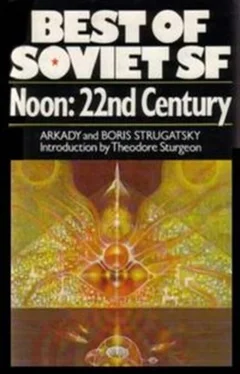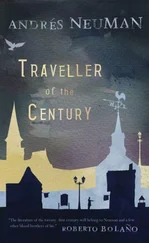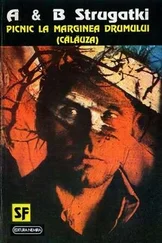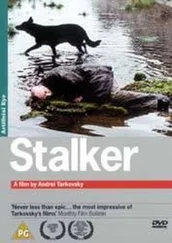The Hunter wandered through the galleries, switching from pavilion to pavilion. The bright African sun—the good, hot sun of Earth—shone down on beasts born under other suns hundreds of billions of miles away, beasts now sealed in vitriplast. Almost all of them were familiar to the Hunter-he had seen them many times, and not only in the museum. Sometimes he stopped in front of new exhibits, and read the strange names of the strange animals, and the familiar names of the hunters.
“Maltese sword,”
“speckled zo,”
“great ch’i-ling,”
“lesser ch’i-ling,”
“webbed capuchin,”
“black scarecrow,”
“queen swan”… Simon Kreutzer, Vladimir Babkin, Bruno Bellar, Nicholas Drew, Jean Sallier fils. He knew them all and was now the oldest of them, although not the most successful. He rejoiced to learn that Sallier fils had at last bagged a scaly cryptobranchiate, that Vladimir Babkin had gotten a live glider slug back to Earth, and that Bruno Bellar had at last shot that hooknose with the white webbing that he had been hunting on Pandora for several years.
In this way he arrived at Pavilion Ten, where there were many of his own trophies. Here he stopped at almost every exhibit, remembering and relishing. Here’s the flying carpet, also known as the falling leaf. I tracked it for four days. That was on Ruzhen, where it rains so seldom, where the distinguished zoologist Ludwig Porta died so long ago. The flying carpet moves very quickly and has very acute hearing. You can’t hunt it in a vehicle—it has to be tracked day and night, by searching out faint, oily traces on the leaves of trees. I tracked this one down once, and since that time no one else has, and Sallier père used to get on his high horse and say that it was a lucky accident. The Hunter ran his finger with pride across the letters cut into the descriptive plaque: “Acquired and Prepared by Hunter P. Gnedykh.” I fired four times and didn’t miss once, but it was still alive when it collapsed on the ground, breaking branches off of the green tree trunks. That was back when I still carried a gun.
And there’s the eyeless monster from the heavy-water swamps of Vladislava. Eyeless and formless. No one had any idea what form to give it when they mounted it for exhibit, and so finally they did it to match the best photograph. I chased it through the swamp to the edge, where several pitfalls were set up, and it fell into one and roared for a long time there and it took two bucketsful of beta-novocaine to put it to sleep. That was fairly recently, ten years ago, and by then I wouldn’t use a gun. Pleased to meet you again, monster.
The farther the Hunter went into the galleries of Pavilion Ten, the slower his steps became. Because he didn’t want to go farther. Because he couldn’t go farther. Because the most important meeting was coming up. And with every step he felt more keenly the familiar melancholy sense of helplessness. The round white eyes were already staring at him out of the clear plastic case…
As usual, he went up to the small exhibit with his head bowed, and first of all he read the notation on the descriptive plaque, which he already knew by heart: “Wildlife of the Planet Crookes, System of EN 92, Carbon Cycle, Type—Monochordate, Class, Order, Genus, Species— Quadrabrachium tridactylus. Acquired by Hunter P. Gnedykh, Prepared by Doctor A. Kostylin.” Then he raised his eyes.
Under the transparent plastic cover, on a polished slanting plate, lay a head—strongly flattened in the vertical plane, bare and black, with a flat, oval face. The skin on the face was smooth as a drumhead, and there were no teeth, no mouth, no nose apertures. There were only eyes. Round, white, with small black pupils, and remarkably widely spaced. The right eye was slightly damaged, and this gave a strange expression to its dead gaze. Lin was a superb taxidermist—the threefinger had had exactly that expression when the Hunter first bent over it in the fog. That had been long ago.
Seventeen years ago. Why did it happen? thought the Hunter. I hadn’t even planned on going hunting there, Crookes had said that there was no life there, except bacteria and land crabs. And still, when Sanders asked me to take a look around the area, I grabbed my carbine.
Fog hung over the rocky screes. A small red sun—the red dwarf EN 92—was rising, and the fog looked reddish. Rocks crunched under the rover’s soft treads, and low crags swam out of the fog one after another. Then something started rustling on the crest on the top of one of the crags, and the Hunter stopped his vehicle. It was impossible to get a good look at the animal at this distance. Furthermore, the fog and the murky illumination lowered the visibility. But the Hunter had an experienced eye. Some sort of large vertebrate was of course stealing along the crest of the crag, and the Hunter was glad that he had brought his carbine along after all. We’ll show up old Crookes, he thought gaily. He raised the hatch, stuck the barrel of his carbine out carefully, and started to aim. At a moment when the fog had gotten a little thinner and the hunched-up silhouette of the animal showed up distinctly against a background of reddish sky, the Hunter fired. Immediately a blinding violet flash rose up from the place where the animal had been. Something made a loud crash, and a long hissing sound could be heard. Then clouds of gray smoke rose up over the crest and mixed with the fog.
The Hunter was greatly surprised. He remembered loading the carbine with anesthetic needles, and the last thing you would expect from them would be an explosion like this one. He climbed out of the rover and started looking for his kill. He found it where he had expected, under the crag on the rocky scree. It really was a four-legged or four-armed animal, the size of a large Great Dane. It was frightfully burned and mutilated, and the Hunter was amazed by what horrible effect an ordinary anesthetic needle had had. It was hard even to imagine the original appearance of the animal. Only the forepart of the head—a flattened oval, covered with smooth black skin, with lifeless white eyes—remained relatively intact.
On Earth, Kostylin had gotten busy with the trophy. After a week he told the Hunter that the trophy was badly damaged and was of no special interest, save, perhaps, as a proof of the existence of higher forms of animal life in the systems of red dwarfs—and he advised him to be a little more careful with thermite cartridges in future.
“You would almost think you’d fired at it out of fright,” Kostylin said in irritation, “as if it had attacked you.”
“But I remember perfectly well that I shot a needle,” the Hunter objected.
“And I see perfectly well that you hit it in the backbone with a thermite bullet,” Lin answered.
The Hunter shrugged and did not argue. He wondered, of course, what could have caused such an explosion, but after all it was not really all that important.
Yes, it seemed quite unimportant then, the Hunter thought. He still stood there, and kept looking at the flat head of the threefinger. I laughed a little at Crookes, argued a bit with Lin, and forgot everything. And then came doubt, and with it, grief.
Crookes organized two major expeditions. He covered an enormous area on the planet that bore his name. And he did not find one animal there larger than a land crab the size of a little finger. Then, in the southern hemisphere, on a rocky plateau, he discovered a landing pad of unknown origin—a round plot of fused basalt about twenty meters in diameter. At first this find had aroused much interest, but then it had been discovered that Sanders’s starship had landed somewhere in that area two years before for emergency repairs, and the find was forgotten. Forgotten by everyone except the Hunter. Because by that time doubts had already formed in the Hunter’s mind.
Читать дальше












